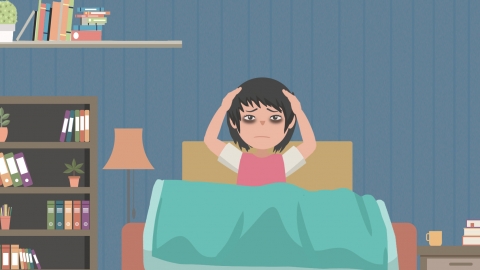What causes dizziness upon waking up in the morning?
Generally, insufficient sleep, rapid changes in posture, hypoglycemia, otolith disorders (benign paroxysmal positional vertigo), and cervical spondylosis may cause dizziness upon waking. It is recommended to seek timely medical consultation to determine the exact cause and receive appropriate treatment. Detailed explanations are as follows:

1. Insufficient Sleep
Staying up late or experiencing poor sleep quality at night can prevent the brain from receiving adequate rest, potentially causing cerebral vasoconstriction and insufficient blood supply. This may lead to symptoms such as dizziness, mental fatigue, and weakness after waking up. It is recommended to adjust sleeping habits, go to bed early, wake up early, and ensure sufficient sleep duration—approximately 7–8 hours per night.
2. Rapid Changes in Posture
Upon waking, if posture changes too quickly—for example, transitioning rapidly from lying down to standing—blood may rush instantly to the lower limbs, reducing blood supply to the brain and causing dizziness. This may be accompanied by instability upon standing and visual darkening. It is recommended to rise slowly from bed and avoid sudden postural changes.
3. Hypoglycemia
Extended periods without food intake, especially after a night's sleep, may lead to low blood glucose levels. Hypoglycemia can cause insufficient energy supply to the brain, resulting in symptoms such as dizziness and fatigue, possibly accompanied by sweating, palpitations, and tremors. It is recommended to eat promptly after waking and follow medical advice regarding the use of medications such as glucose and sodium chloride injection, hydrocortisone tablets, and mannitol injection to alleviate symptoms.
4. Otolith Disorders (Benign Paroxysmal Positional Vertigo)
Otolith disorders occur when otoliths in the inner ear become dislodged and enter the semicircular canals. When head position changes, these displaced otoliths move and stimulate the receptors within the semicircular canals, causing sensations of false rotational dizziness. Episodes of otolith disorders are typically associated with changes in head position, such as turning over in bed, getting up, or lying down. It is recommended to follow medical guidance in using medications such as promethazine hydrochloride tablets, betahistine hydrochloride tablets, and ginkgo biloba extract tablets for treatment.
5. Cervical Spondylosis
Cervical spondylosis may result from improper sleeping posture or excessive neck movement. In cervical spondylosis, herniated cervical discs or bone spurs may compress cervical nerve roots or the vertebral artery, affecting cerebral blood supply. Dizziness may be easily triggered when turning or extending the head and neck, possibly accompanied by neck stiffness and pain, as well as arm numbness. It is recommended to follow medical advice in using medications such as chlorzoxazone tablets, eperisone hydrochloride tablets, and naproxen sodium tablets to alleviate symptoms.
In daily life, one should pay attention to moving slowly when getting up. After waking, lie in bed for a few minutes, move the limbs, then sit up slowly, waiting for the body to adjust before standing.





